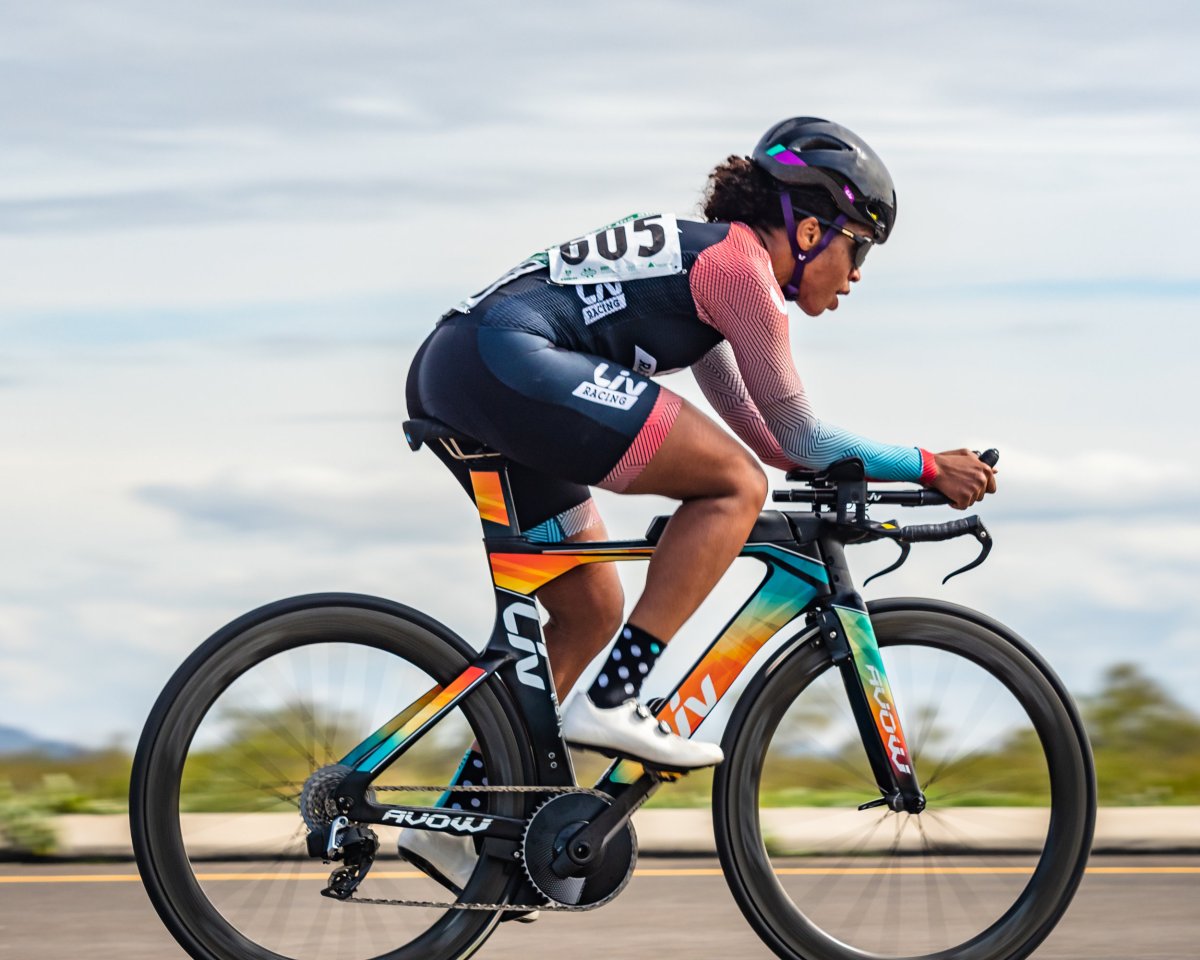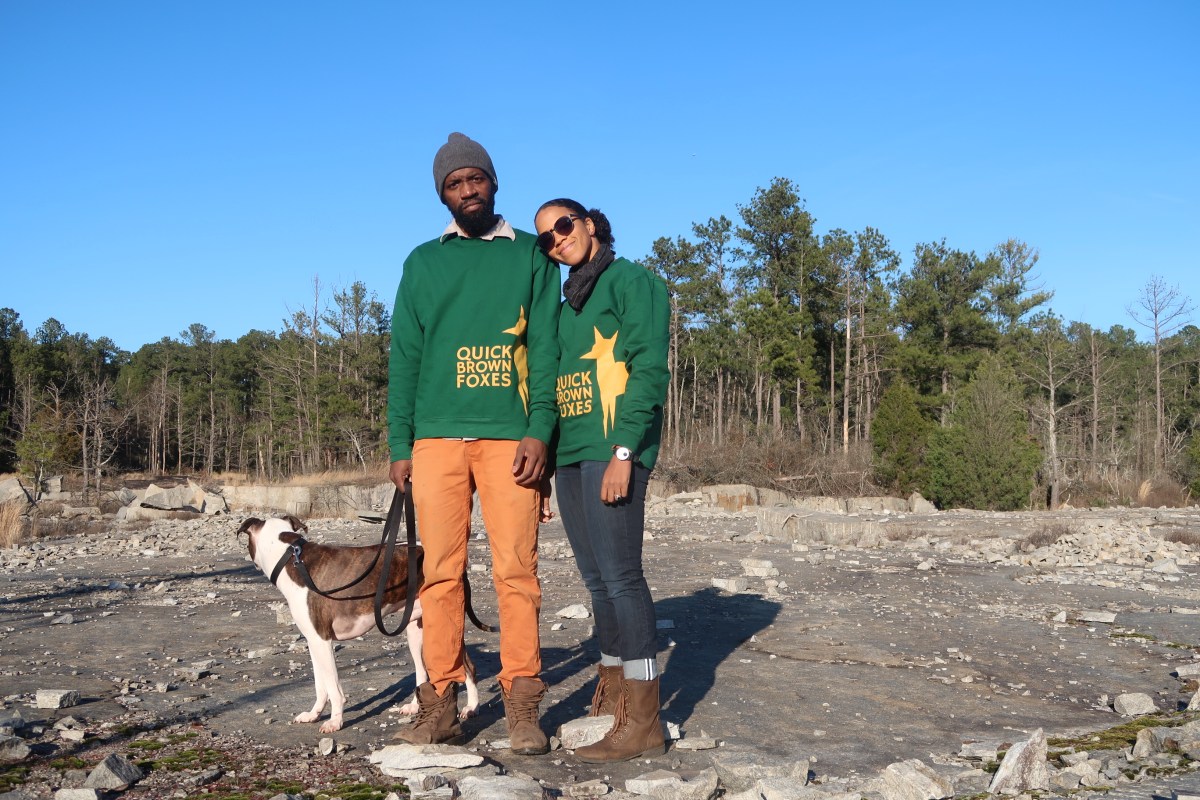On the first day of 2015, Ayesha McGowan published a to-do list on her blog, “A Quick Brown Fox.” On her list:
- Get more women/women of color on bikes
- Upgrade to Category 2
- Finish Top 5 in any given Track Crit
- Win another State Championship
- Race in a state I’ve never been to before
- Spend more time with my family
- Get married
- Be Awesome
The years since have been busy, and McGowan’s determination—what she calls her strongest asset—continues to push her on and off the bike. She travels across the country with her now-husband, William Loyd, to compete in stage races and criteriums with the fastest women cyclists in the country and the world. She races in USA Cycling’s pro category 2, a ranking she achieved by earning enough points in enough races, and which now grants her access to compete in professional races. Going into this season, her goal was to get a top-20 result at a professional stage race. Her therapist suggested she aim higher, for a top 10. Then, in early April, at the Joe Martin Stage Race, an event sanctioned by Union Cyclist Internationale, McGowan crossed the finish line in 10th place. By setting big goals, McGowan opens herself up to new possibilities.
“It’s not setting myself up for doubt, because then I’m definitely going to fail,” she says. “But if I try to win, then I’m going to be pretty good. And even if I don’t win, pretty good is still awesome.”
The 32-year-old says she is racing her best season yet. She has also become a leader and advocate for representation and diversity in cycling.
“Representation is super important,” says McGowan. “If you see somebody that you identify with doing something, then you are more likely to see yourself doing that thing.”
Last year, McGowan appeared on the cover of Outside magazine as one of the “new faces of adventure” with a feature-length profile discussing her goal to be the first African American female professional cyclist. This goal may very well be McGowan’s most encompassing. It’s also one that still remains just out of reach.
“I think a lot of people consider me to be a professional cyclist,” says McGowan. “Theoretically, if you go by the definition of someone who gets paid to ride bikes, that’s me. At this point, somehow, I’ve managed to make that happen. But road racing is a team sport and I do not have a team. And so, because of that, I don’t consider myself a pro cyclist.”
She continued: “Part of that might just be my imposter syndrome, or part of it might be my own self-criticism. I think about this a lot…I feel like if I’m not 100 percent there, like I’m not 100 percent certain of what it is, then maybe I haven’t done it. And I don’t want to claim I’ve done something and not have done it.”
With that, McGowan and I launched into a big discussion about what it means to be a professional cyclist, the barriers to entry, how integrity and dreams might collide, and what she does to focus, stay the course and win.
The following interview has been edited and condensed for clarity.
Why do you need a team to be a professional cyclist?
There are certain races you cannot race by yourself. And so, you have to have a team to do them. There’s a thing called composite teams, which is like a band of teamless people who form a team just for that event. So, I’ve been a part of composite teams and that’s how I was able to do Redlands and Joe Martin. And I’m going to do the Colorado Classic at the end of August this year, and that will be a composite team, as well.
In the States, we have a huge criterium scene, as well. Road racing is gravitating toward that because there is more opportunity. While you have a better chance with a team, you don’t need a team to do a criterium. So I can just register as an individual, show up and race. I do that all the time.
There are people who consider themselves professional cyclists and all they do are criteriums, and that is hard. Pro criteriums are really challenging … That’s where I started in New York City, because it was the easiest thing to access.
But for me, I’ve always wanted to do road stage races. We all see racing in Europe and the Tour de France, which is the most popular road stage race. That’s the image I have. Not necessarily the Tour de France—I mean, that would be rad, hopefully they work that out [to allow women to race]. But that type of racing is the kind of racing I’ve always dreamed of doing, since I started.
So how does one get on a team?
It’s super frustrating, and that’s not something I say out loud very often. There are some people who are undeniably talented and they get the spot. For other people, they know the right person and they get connected. I feel like I’m somewhere in between. I’m talented, but I’m clearly not the best. I’ve met people and have had opportunities come my way. I’ve had near-misses, where those opportunities were laid at my doorstep, and then were taken away at the 11th hour. That was heartbreaking. It was so close, I could feel it. It felt like a sure thing, but nothing is sure.
Getting on a team means you convince somebody to let you on their team. It’s helpful to be talented, but you don’t necessarily have to be the most talented. It’s helpful to know the right people, but that doesn’t always matter.
And then, with me, I’m a very vocal advocate for representation. I feel like, for a lot of people, that feels like a risk. Women’s cycling has their struggles, right? There’s not a lot of money. You’re dependent on sponsors. Someone [who is vocal] can be very challenging for a lot of people and teams. People don’t like controversy. They don’t like being challenged in that way, and so it’s just safer to not deal with that, right?
I have this conversation with myself all the time. If it comes down to it, do I choose my integrity or do I choose my dreams? Can I have both? Can they coexist? I don’t know. I literally have to find a team that thinks they can.

Photo Credit: Jeff Clark
How do you manage your fears and anxieties, so that when you get on the bike, you can focus on the course ahead?
The great thing about bike racing is that it demands all of your focus. Training, if you’re doing it right, demands all of your focus. So maybe there’s an element of escapism to it. When I’m doing this thing, nothing else matters. Nothing else is important. This is all I’m responsible for right now. All I need to do is race my bike in this moment.
Can you give me a picture of what it looks like for you to prepare for a race?
This year, I have my husband with me all the time, which has been super helpful.
I suffer from depression and anxiety, and so that makes some things really hard. Like yesterday, I raced and just before, I felt really awful. I was having a hard time getting myself together and making sure I had everything I needed. It wasn’t even that I was anxious about the bike race. Once you get there, you’re in it. It’s getting to the starting line that is so challenging sometimes, making sure I have my shoes, my helmet, my kit, just basic stuff.
Day to day training, I have a really amazing coach, Jim Lehman, and that has made a world of difference for me. I think a coaching relationship can be complicated in many ways, because you are putting so much trust in this person. I’m putting my dream in your hands and hoping that you guide me to where I want to go. I get that I have to do the work, but I’m coming to you.
When you’re on your bike, what are some of the tools or tactics that you use to stay strong, go fast and be present?
It’s been a work in progress. Having confidence in my fitness has been super helpful. Working with this coach and knowing that I have prepared myself physically is such a relief. There was always doubt that I hadn’t done enough, and I don’t have that anymore.
Now, I push myself more. I tell myself, ‘The pack is going, you go too.’ If it doesn’t work out, it doesn’t work out. But I’m strong enough to try.
Any sport, a lot of it is mental. I’m super strong. I’m super tough. I know I can hang out. But now I’m getting to the point where I can be competitive, I can be good and have good results. I just need to give myself the opportunity.

McGowan with her husband, William Loyd. (Photo Courtesy: Ayesha McGowan)
You mentioned that you struggle with imposter syndrome. How do you combat that?
The one promise I make to myself is that I keep showing up. There was a period of time where I would talk myself out of showing up and it was a dark time. I don’t think it helps at all. I think it made things infinitely worse.
So, get to the starting line. Like, maybe you don’t get to the finish, but you tried to, right? Get to the starting line. That is the biggest tool that I’ve had to combatting every single anxiety, depression, imposter, whatever issue that I’ve ever had. If I can get myself to the starting line and get going, usually things get so much better.
What are some of your new goals?
I would like to get a couple of top tens under my belt. I’ve done it once and I want to do it again. That’d be a huge confidence builder and it would be good for teams to see that it’s not a fluke. So, just keep pushing myself and racing as hard as I can and not counting myself out.
And speaking my truth is another thing. It’s exhausting to put yourself out there and have people beat you down a little or a lot. And then to have to say it again, because they didn’t get it the first time.
I think my goals are to race as hard as I can and don’t be afraid to speak my truth, whatever it is. And also to give myself the space and time to heal, both physically and mentally, whatever that looks like.
